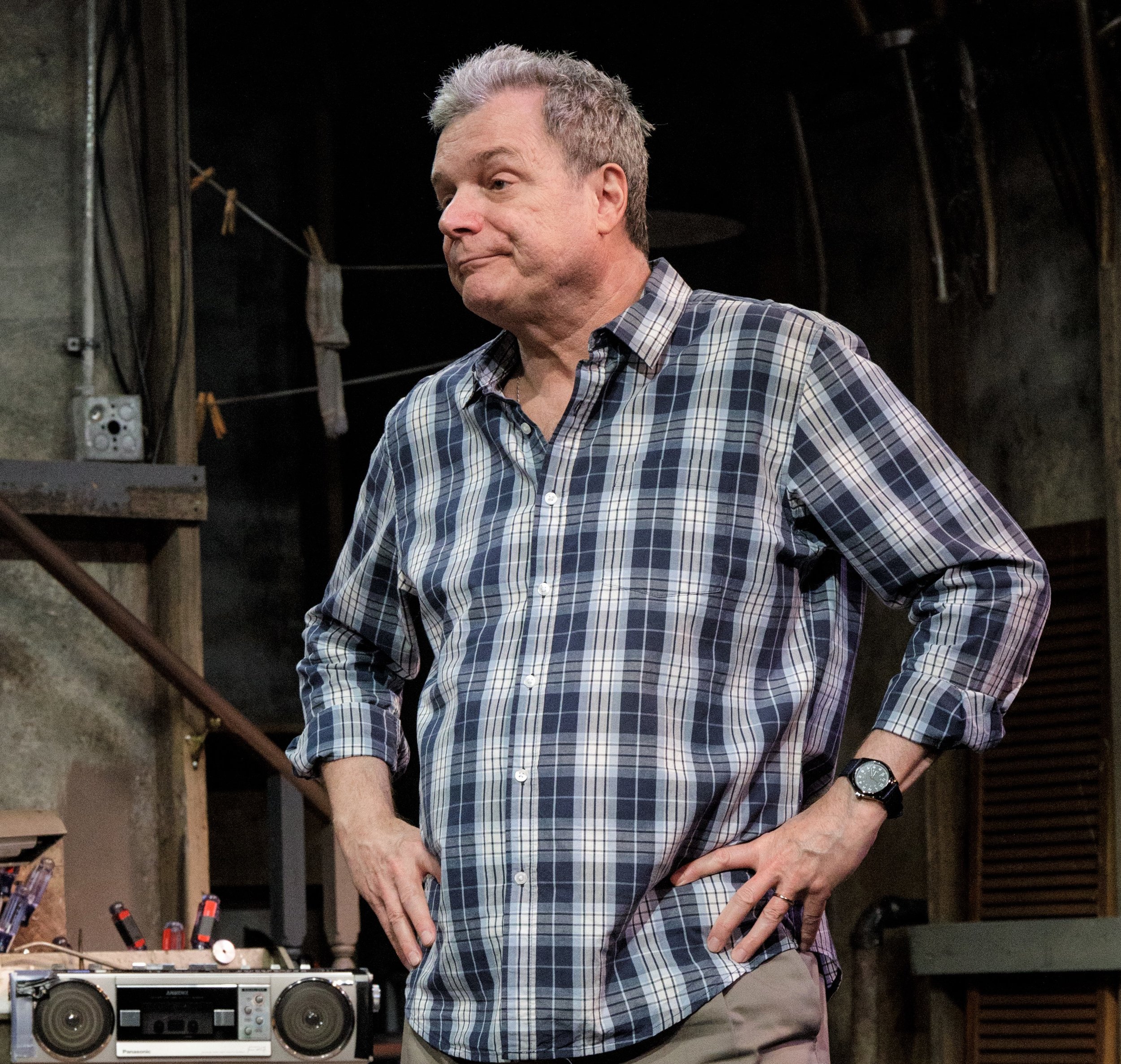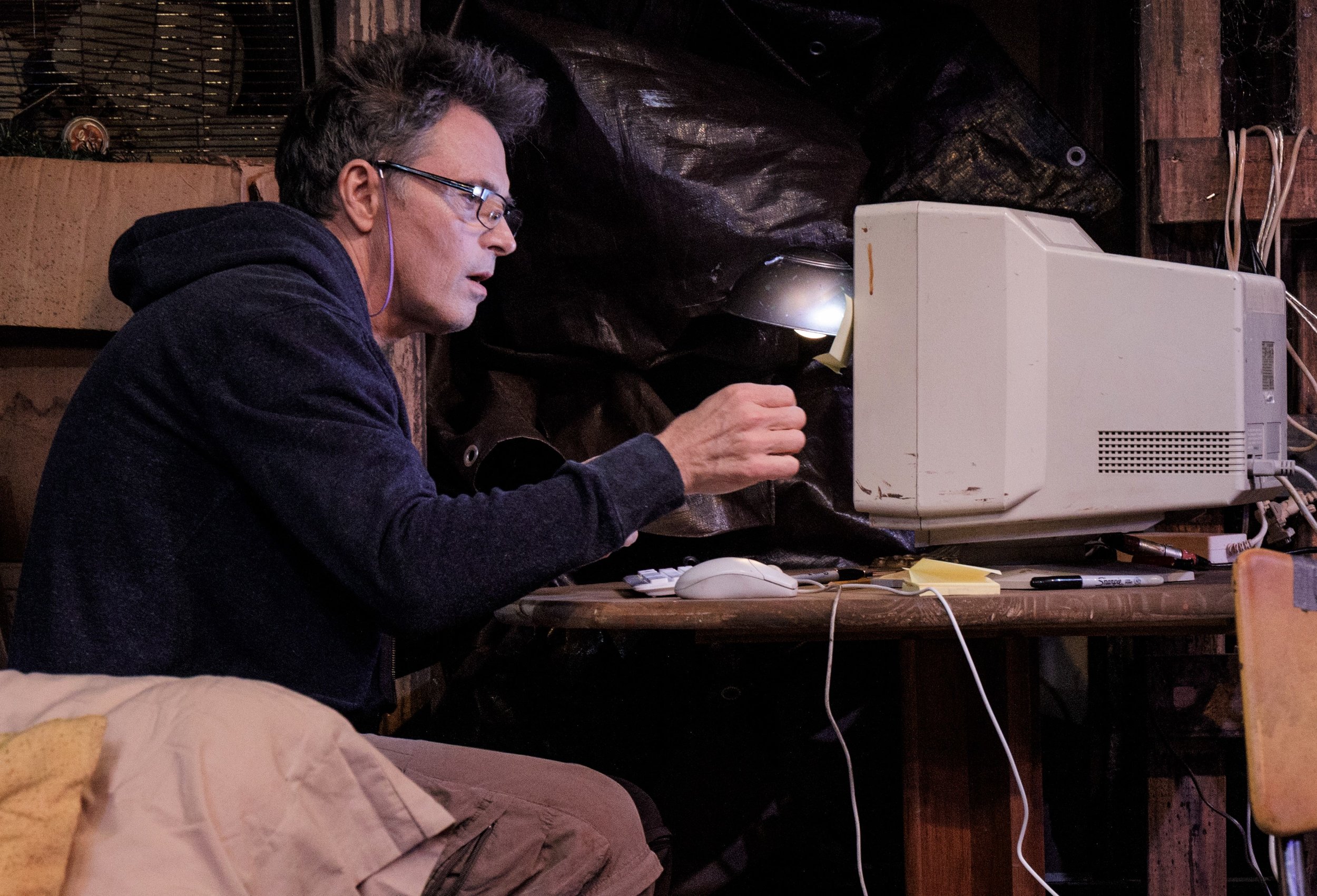At the start of Still, two people—long ago, a couple; now, well over 60—are getting reacquainted in a swank hotel bar with a cocktail and a conundrum. Helen (Melissa Gilbert) comments that “the cells in your body” are “renewing themselves all the time,” and “after seven years you’re a completely different person,” at least “on a cellular level.” Mark (Mark Moses) recalls a “brain teaser” about a ship: “it’s made of wood, and every time part of it breaks they replace it with a part made of metal. And eventually every single part has been replaced. Is it still the same ship?”
Still
The title of Lia Romeo’s play Still, it must be clarified, is unrelated to manufacturing moonshine in the mountains of Appalachia. Rather, her wistful two-hander is about seniors reconnecting—the kind of story that pops up periodically in bridal pages about two spouses whose longtime partners have died and who have somehow reconnected with their youthful heartthrobs. The stories carry an inherent charm, one that is aided immeasurably by two superb performers, Jayne Atkinson and Tim Daly.
Eureka Day
Jonathan Spector’s new play Eureka Day is the unusual satire that takes aim at left-wing politics. It is perhaps the most notable rare bird of its kind since Jonathan Reynolds’s wonderful Stonewall Jackson’s House, which appeared more than 20 years ago. Spector sets his play in Berkeley, Calif., a town whose radical politics have put it at the forefront of social change yet also earned it the nickname Berserkeley.
Downstairs
As the novelist Joseph Heller observed, “Just because you’re paranoid doesn’t mean they aren’t after you.” And as the three characters who barely survive Theresa Rebeck’s twisting and twisted thriller, Downstairs, demonstrate, paranoia is merely one indication that someone you know could be harboring bad intentions. Other warning signs include psychopathic tendencies, the inability to separate reality and fantasy, and sheer, anesthetizing dread. Maybe your workmates are dispensing poison, or your husband is not the man you thought you knew, or your sister has had enough. Maybe that pipe wrench would be an effective blunt instrument. Or, maybe it’s just all in your head. Rebeck and her stellar cast keep us guessing through a tense, intermission-less hour and 45 minutes, while simultaneously pondering larger questions involving inheritances of both the genetic and financial variety.
John Procaccino plays Gerry, the controlling husband of Irene in Theresa Rebeck’s Downstairs. Top: Real siblings Tyne Daly and Tim Daly are Irene and Teddy, the sister and brother in Rebeck’s thrilling family drama.
Basements are notoriously the dark room where the bodies are buried, but Rebeck flips the script from the start. With a comfy couch, a coffee-making machine, and a ray of light coming in from a street level window, the downstairs is the only secure space to be had in the house of Irene and Gerry (Tyne Daly and John Procaccino). Finding safety there is Irene’s brother, Teddy (Tyne’s real-life brother, Tim Daly). He is in lost-boy mode, a grown adult wandering the room in his underpants with a glazed expression on his face. He’s had a tough time of late, but just how reliable are his tales of woe and plans for redemption? Given his stinginess with details and his shaky grasp of reality, chances are he is just plain desperate.
None of this is lost on Irene, who genuinely cares about her sibling, fortifying him with this sanctuary as well as with hot meals and desserts from their youth. Their interactions reveal an ominous family history involving an absent father and a cruel, alcoholic mother who left Irene a cash windfall and bequeathed Teddy nothing other than an unstable mind.
Irene, meanwhile, has her own dilemma. Her husband has, over the years, broken her to the point where she has become a hostage in her own home. Her talks with Teddy reveal that Gerry has taken over the finances, denied her the chance to have children and generally terrorized her into submission. The audience first encounters him at the same time Teddy does. With Irene out shopping (at least, we hope she is out shopping and not, perhaps, stuffed in an upstairs closet), the man of the house comes down to give Teddy his marching orders. He is a big guy with a creepy calmness who cannot quite sell the story that it is Irene who really wants him gone. The second time we encounter Gerry, Teddy has indeed made a departure but not before leaving Irene with information she can use to free herself from her living hell. In a wonderfully dark resolution between husband and wife, Gerry goes full psycho, uttering menacing lines like, “You found rat poison in the basement? Maybe I was killing rats.” Irene, though, holds the upper hand, and it is clenching that pipe wrench.
“Warning signs include psychopathic tendencies, the inability to separate reality and fantasy, and sheer, anesthetizing dread.”
Despite such theatrics, Rebeck avoids melodrama and endows her work with patches of poetry. For instance, reflecting on the mechanics of human nature, Irene observes, “There’s that funny thing they say, that all your cells die every seven years. ... You’re a new person, every seven years. So since then, since we were kids, we’ve been new people how many times?” Director Adrienne Campbell-Holt knows when to be subtle and when to be harsh, exploiting the seeds of doubt that, despite what the audience knows to be true, never quite go away. Is Gerry really a madman, or a reasonable fellow with an unstable wife? How is Teddy sure of his sister’s predicament while barely understanding his own? Is Irene a victim of abuse, or does insanity run deep in the family? Late in the play, Teddy is passed out on the couch, and the odds are fifty-fifty that he is either in a happy slumber, or stone-cold dead.
Teddy (Daly) makes an unsavory discovery. Photographs by James Leynse.
Mr. Daly skillfully walks the line between victim and savior. Ms. Daly, returning to the Cherry Lane, where her theater career began in 1966, pulls off the admirable feat of bringing depth to a character who has been beaten numb. And Procaccino is bone-chilling, chewing the scenery when called for, demonic when up against the wall. Among the many clever touches in the scenic design by Narelle Sissons, the smartest is the landing near the top of the staircase that leads from the unseen upstairs down to the basement. It serves as a beacon. When we spy Gerry, visible from the waist down, pausing there, the tension mounts. When a pair of female legs come into view, there is a palpable sigh of relief that Irene is still on her feet.
Theresa Rebeck’s Downstairs runs through Dec. 22 at the Cherry Lane Theatre (38 Commerce St.) on a schedule as twisted as its plot. Evening performances are at 8 p.m. Tuesday through Saturday, with an additional performance at 8 p.m. Dec. 2 but none on Dec. 20. Matinees are at 2 p.m. Wednesday and Saturday and 3 p.m. Sunday but there are no matinees on Nov. 28 or 30, or on Dec. 12. For ticket and information, call (212) 352-3101 or visit primarystages.org.
Concealed and Revealed
“Camouflage: to be in plain sight, but not to be seen” is the undercurrent of Cal in Camo, about a family dealing with grim challenges. At the heart of the play are a husband struggling to provide for his wife and child; the wife who has little, if any, affinity for her newborn; and her backwoods brother, a man of few words, whose own wife has recently drowned. Given the somber plot, Cal in Camo is often surprisingly humorous, with actors who reach deep to pull out emotionally charged performances.
David Harbour plays Tim, who is languishing in a small Illinois town as a distributor of craft beer. His wife, Cal (Katya Campbell), is a stay-at-home mom. Their arguments may resonate as typical, but the writing by William Francis Hoffman delivers the stories wrapped in a unique casing. Relish the amusing moments, because Cal in Camo is a gut-wrenching play. The topic of Cal’s brother Flynt, his behavior at their wedding two years earlier, as well as his upcoming visit, is fodder for intense, fast-paced dialogue.
When he arrives, Flynt (Paul Wesley) just peels away another layer to the family secrets. However, it’s Wesley’s perfectly stilted delivery of Flynt’s simplistic view of the world that is bold: “You wanna bond with that baby...you take that baby dirty as she is....diaper dirty....you…strip her down...and you strip yourself down…and you get down on the ground you wrap your whole body around that baby….even though you might not know what you’re doin’ at all...that’s nature...nature knows what ta do.... like water knows where ta go...you just gotta let it find you.”
Campbell’s Sybil-like performance is striking; on one hand fighting with Tim, her unmotherly response to the cries of her child juxtaposed with her schoolgirl excitement to see Flynt. The reveal of their mother abandoning them and Cal’s experience in and out of foster homes is telling: “The way I grew up in all those different homes with all those different families...you learn not to want...you keep your eyes in front of you...if you don’t want they can’t take anything away from you if you don’t need they can’t break your heart…but I got caught up in this idea this picture of family this thing you had and I started to believe it.”
Harbour takes Tim's lack of trust to a new, in-your-face level—the performance is solidly Harbour. His sheer size next to Campbell takes on a brutish, commanding figure, and his resentment being dragged to rural Illinois by Cal is evident in every gesture, as well as everything he doesn’t say.
The opening scene with Cal on the floor attempting to pump her breasts of milk feels like it was put there for shock value. In that regard, it steals the thunder from the scene of Cal and Tim fighting about her inability to produce milk, which requires them to purchase formula.
Once Tim arrives home to the family kitchen, complete with sliding door to the backyard, John McDermott’s set design works harder. With Flynt standing on the porch, having just walked out of the kitchen, the set rotates, and he is standing on the back porch. Grant Yeager delivers crisp lighting design and, coupled with sound design by Amy Altadonna, creates the perfect storm scene. Altadonna’s baby cries are spot-on, whether through a baby monitor, from the other room, or coming from the traveling car seat.
Cal in Camo is meant to be uneasy, and director Adrienne Campbell-Holt makes sure of it. The dialogue is fast and the narrative hard, begging to be heard. Living is in the asking and yet being vulnerable to the answers; that’s where the heart grows. For the actors it is evident that they know the material and they listen; even more important, they respond in kind. The camouflage is ripped aside and the human spirit is revealed, bruises and all.
Cal in Camo continues at Rattlestick Playwrights Theater (224 Waverly Place, just west of 7th Avenue) through June 12. Evening performances are Wednesdays-Saturdays at 8 p.m. and at 7 p.m. and Sundays and Mondays; matinees are at 3 p.m. Saturdays. Running time is 85 minutes. For more information and tickets call Ovationtix at (866) 811-4111 or visit www.rattlestick.org.














